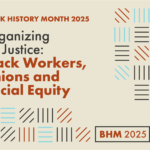
Canada’s unions seek to remove barriers to employment for workers with disabilities
Canada’s unions are marking December 3, the International Day for Persons with Disabilities, by calling on the government to do more to remove barriers in its accessibility legislation.
Along with their allies in the disability rights movement, Canada’s unions recently welcomed the introduction of Bill C-81, the Accessible Canada Act. However, they would like to see more focused attention on the identification and removal of barriers to employment at workplaces across Canada.
“For decades, the disability rights community has advocated for the introduction of federal legislation on accessibility,” said CLC Executive Vice-President Larry Rousseau. “We are pleased to see the government deliver on its promise for this legislation, but they will need to go further to truly remove barriers for workers with disabilities.”
Given that the Act identifies “employment” as one of seven areas specified for the identification and removal of barriers, and the prevention of new barriers, the CLC has identified a number of amendments to improve the efficacy of the Act.
In particular, new workplaces standards on accessibility would be developed in the Act without any language that mandates the inclusion of unions or considers the important role of bargaining agents in the development of these standards. As such, the CLC is calling for amendments to the Act that:
- protect workers’ bargaining rights;
- establish clear enforcement mechanisms that support employer accountability and compliance; and finally
- integrate an intersectional framework throughout the Act that recognizes the diversity of identities and barriers of people with disabilities.
“We are committed to working with this government to adopt and implement an amended Act that sets an example for countries around the world,” said Rousseau. “This is our opportunity to put Canada on the map as a global accessibility leader.”
The CLC has also called for amendments that would ensure C-81 aligns with and enhances the application of other existing legislation, regulations, policies, programs and services. This includes ensuring consistency between the legislative application and treatment, standards and requirements of employers in C-81, and those in existing legislation, such as the Employment Equity Act.
You can read and share our full submission on the Accessible Canada Act here.
The International Day for Persons with Disabilities was first proclaimed by the United Nations General Assembly in 1992.





